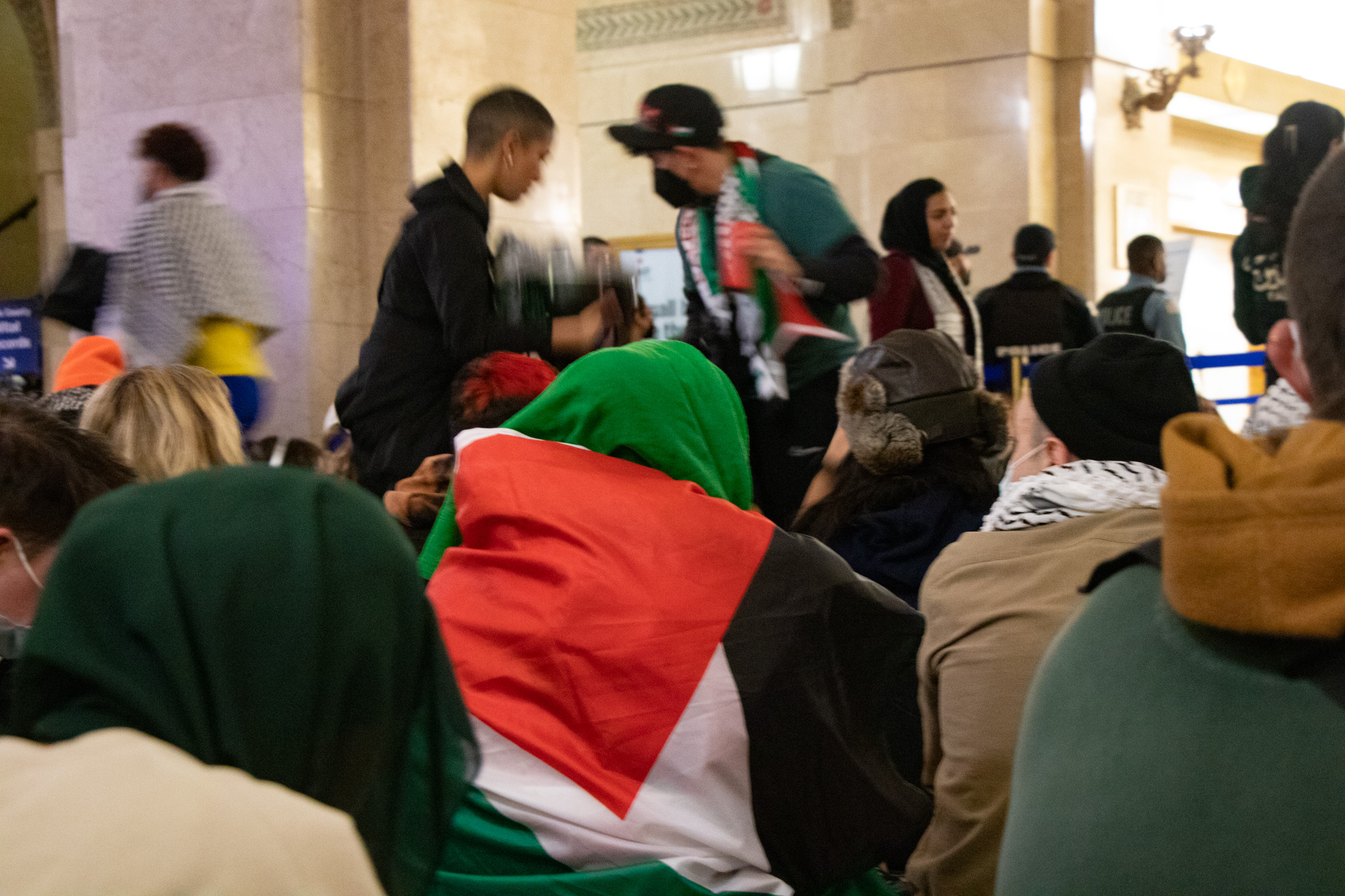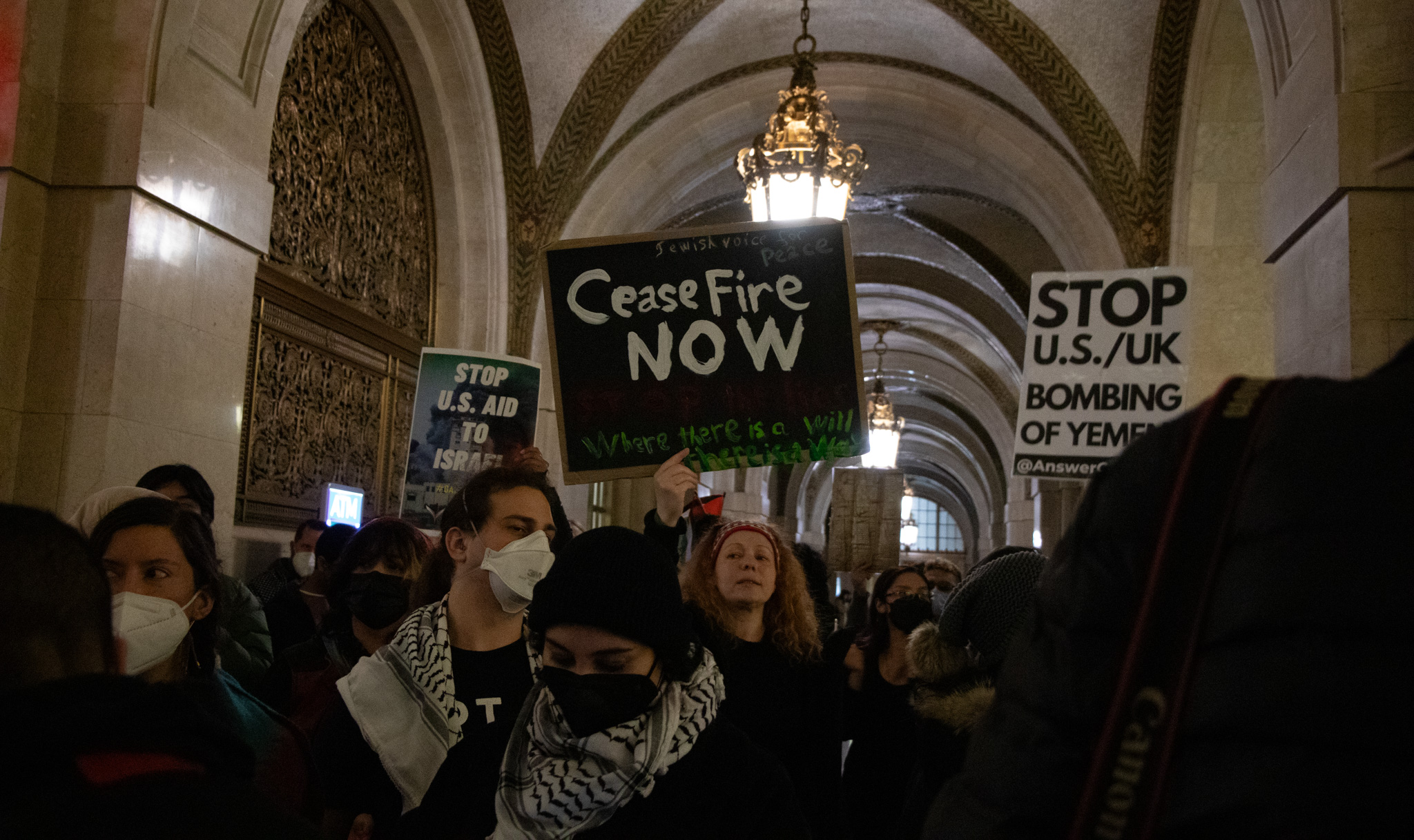In a tie vote broken by the mayor, the city is still divided on the call for ceasefire.
Tension filled Chicago City Hall on Wednesday as votes were tallied for whether or not the city was to call for a ceasefire in Gaza. Mayor Brandon Johnson broke the 23-23 tie with his final vote. This decision comes after months of protests and debates over the topic in City Hall.
Isra Rahman, a member of the Chicago Dissenters chapter, an anti-militant activist group, waited all day for City Hall to make a decision.
“A lot of us were really uncertain about what was going to happen. I think it set a bad tone, perhaps where we were like, ‘Are they on our side, are they not?’” Rahman said.

Protestors waited outside in the halls, and only a small number of them were allowed in the chamber to watch. Photo by Grace Del Vecchio.
Chicago is the largest city to call for a ceasefire. As the third-largest city in the nation, all eyes were on the tension-filled meeting where alderpeople were arguing on the floor. Outside, hundreds of voices filled the walls of City Hall. Chants filled the hallways while others had their ears pressed up against phone speakers, eager to hear the votes of the council members. The vote, which was delayed an hour, kept the protestors on their toes.
Chicago has had a series of protests in the city in the last few months after the attacks of October 7, in which Hamas killed about 1,200 Israeli people and took about 250 hostages. Pro-Palestinian protests have called for a ceasefire because of the relentless attacks from Israel on the Gaza strip, which has led to over 27,000 Palestinian deaths and 66,000 injured.
Chicago, is home to the largest Palestinian population in the nation, with the Bridgeview neighborhood being referred to as Little Palestine. Chicago is also called home by a large population of Jewish people, with more than 300,000 living in the metropolitan area. This has led to tensions in the city, from interrupted City Hall meetings to Biden visits being protested.
The council, which previously condemned the Hamas attack on Israel, after three hours of deliberation, reached a verdict after Mayor Brandon Johnson broke the tie vote. The resolution, led by Alderpeople Daniel La Spata (1st), and Rossana Rodriguez-Sanchez (33rd), along with a ceasefire, called for humanitarian aid and an immediate release of all hostages.
“Be it resolved, that we, the members of the Chicago City Council, do hereby call for a permanent ceasefire to end the ongoing violence in Gaza; call for humanitarian assistance including medicine, food and water, to be sent into the impacted region; and the immediate and unconditional release of all hostages,” the resolution reads.
Chicago is the biggest city to call for a ceasefire, following cities like Detroit, San Francisco and St. Louis. While there are no binding legal implications, the resolution signifies the mutual will of the council.
Many have asked the question: “Why are cities voting on foreign matters? Does it mean anything?”
“Do I believe that the words that we speak today, how we vote today, directly influences international policy? I don’t. I don’t have those illusions,” La Spata said. “But we vote with hope, we vote with solidarity, we vote to help people feel heard in a world of silence.”
DePaul political science professor Joseph Mello feels that the vote reflects the wants of their constituents in an ideological sense.
“City council members are typically focused on local issues like fixing potholes and dealing with crime. I doubt they would put something like this on their agenda unless they felt like it was something their constituents really wanted,” said Mello.
Rahman mirrored this sentiment. She believes that the people who showed up are also indicative that it matters to a variety of people in the diverse city.
“If it didn’t matter to Chicagoans, it would just have been Palestinians organizing for the ceasefire resolution,” she said. “But in reality, it was a coalition of people across the city, across different faiths across neighborhoods, issues based on general organizing groups, all coming together in order to push our alderpeople and our mayor to vote for the ceasefire resolution.”

A protestor holds up a “Jewish voice for peace” sign . People of all backrounds filled City Hall. Photo by Grace Del Vecchio
Mello, who teaches classes on social mobilization, believes that this agreement’s significance lies in its further political implications for the new mayor.
“I think [Johnson] would have a tough choice to make. His brand is as a progressive and the progressives are very pro-Palestine right now, so he risks losing some of his cred with those groups if he doesn’t,” Mello said.
Pro-Palestine protesters also firmly believe that the vote matters on a larger scale to represent the wants of the American public. A DePaul activist, who asked to remain anonymous to avoid further harassment, was in attendance at City Hall at 6 a.m to see the council vote. Bright and early, she chanted along with hundreds. She feels that this political involvement of voting on the ceasefire will invoke others to care.
“Politically it means something, because it shows us that our voices do matter. We were there in hundreds, and we were chanting, and people were calling and contacting their alderpeople and their congressmen and their senators constantly,” she said.
Mello noted that where he lives in Highland Park, a large majority of liberal Jewish citizens are unhappy with the decision. Alderperson Debra Silverstein (50th Ward) is the sole Jewish member in the council. Silverstein represented this viewpoint in her argument for her own agreement plan, which solely called for the release of hostages. She called for the city to align its call to Biden’s foreign policy, and to not continue to further the divisiveness in the city.
“It’s time to work on unifying the city instead of dividing it. We could have used you as a unifier here, too,” Silverstein said to Johnson.
Mello believes the call for ceasefire, which passed by slim margins, is also representative of further infighting with the Democrats in the city.
“I think more than anything it shows that there is indeed a rising split within the Democratic base over Israel-Palestine. If I am Joe Biden, I’d really hate this. It probably pushes him to take a tougher stand towards Israel, because he is going to need those youth voters to turn out in big numbers if he wants to win re-election,” Mello said.
The city of Chicago holds huge political power in the Democratic Party as well. Rahman noted that this alone shows the significance of the call for ceasefire.
“I think the fact that this happened in the city where the DNC is coming is a big, telltale sign of how people are feeling about politics, and what they’re demanding of their representatives,” Rahman said.
Both protestors noted that their activism doesn’t stop there. The tie vote might indicate that this argument is far from over in the city. The DePaul student mirrors the sentiment of many protesters’ end goal.
“We are definitely not done. I think, obviously, the goal is to see a free Palestine,” said the student.
Header by Grace Del Vecchio




NO COMMENT